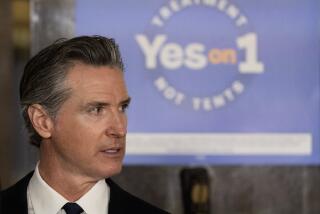Did the California stem cell program promise miracle cures?
You be the judge.
Alan Trounson and Jonathan Thomas, the president and chairman of California’s stem cell program, have taken issue with how I characterized their program in a column this week. I pointed out that its founding 2004 initiative, Proposition 71, “was sold to a gullible public via candy-coated images of Christopher Reeve walking again and Michael J. Fox cured of Parkinson’s.”
I continued: “The implication was that these miracles would happen if voters approved a $3-billion bond issue for stem cell research.”
In a letter to the editor published Wednesday, Trounson and Thomas asserted, “No ads for Proposition 71 promised miraculous cures.”
So let’s look at the record. It may be true that no ads for Proposition 71 used the term “miraculous cures,” but then neither did I. What did the ads promise, however? Several of them have been archived by UCLA, and here’s what we find.
Reeve taped an ad shortly before he died, in which he observed, “Stem cells have already
cured paralysis in animals. Stem cells are the future of medicine.”
Michael J. Fox taped an ad in which he urged, “Vote yes on 71, and save the life of someone you love.”
Joan Samuelson, a leading Parkinson’s patient advocate, is shown in another ad asserting, “There are more Americans than I think we can count who are sick now, or are going to be sick in the future, whose lives will be saved by Prop. 71.” Shortly after the measure passed, Samuelson was appointed to the stem cell program’s board.
Do these ads amount to promising “miracles”? Given that the essence of scientific research is that no one can predict the outcome, to assert as fact that “lives will be saved by Prop. 71” is plainly to promise something downwright extraordinary, if not outright miraculous.
Yes, this is the language of advertising, not research, but for Trounson and Thomas to pretend that the ad campaign somehow promised merely “good science” and not specific outcomes, as their letter suggested, is (at least) miraculously disingenuous.
The campaign made a direct link between the creation of the $3-billion stem cell program and the discovery of definitive cures for specific diseases. It’s true that science takes time and patience, but you wouldn’t have known that from the Proposition 71 ad campaign.
RELATED:
Hiltzik: Tobacco taxes are great, but not Proposition 29
Hiltzik: Stem cell agency needs to study itself
Hiltzik: The cost of California’s solar trailblazing
More to Read
Inside the business of entertainment
The Wide Shot brings you news, analysis and insights on everything from streaming wars to production — and what it all means for the future.
You may occasionally receive promotional content from the Los Angeles Times.











